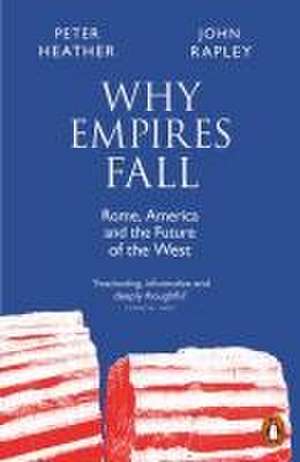Why Empires Fall
Autor John Rapley, Peter Heatheren Limba Engleză Paperback – 30 mai 2024
“[A] provocative short book . . . with a novel twist.”—The Economist
Over the last three centuries, the West rose to dominate the planet. Then, around the start of the new millennium, history took a dramatic turn. Faced with economic stagnation and internal political division, the West has found itself in rapid decline compared to the global periphery it had previously colonized. This is not the first time we have seen such a rise and fall: the Roman Empire followed a similar arc, from dizzying power to disintegration.
Historian Peter Heather and political economist John Rapley explore the uncanny parallels, and productive differences, between ancient Rome and the modern West, moving beyond the tropes of invading barbarians and civilizational decay to unearth new lessons. From 399 to 1999, they argue, through the unfolding of parallel, underlying imperial life cycles, both empires sowed the seeds of their own destruction. Has the era of Western global domination indeed reached its end? Heather and Rapley contemplate what comes next.
| Toate formatele și edițiile | Preț | Express |
|---|---|---|
| Paperback (2) | 57.05 lei 24-35 zile | +18.57 lei 4-10 zile |
| Penguin Books – 30 mai 2024 | 57.05 lei 24-35 zile | +18.57 lei 4-10 zile |
| Yale University Press – 10 sep 2024 | 95.70 lei 3-5 săpt. | |
| Hardback (1) | 143.71 lei 3-5 săpt. | |
| Yale University Press – 5 sep 2023 | 143.71 lei 3-5 săpt. |
Preț: 57.05 lei
Preț vechi: 68.94 lei
-17% Nou
Puncte Express: 86
Preț estimativ în valută:
10.92€ • 11.26$ • 9.24£
10.92€ • 11.26$ • 9.24£
Carte disponibilă
Livrare economică 14-25 februarie
Livrare express 25-31 ianuarie pentru 28.56 lei
Preluare comenzi: 021 569.72.76
Specificații
ISBN-13: 9780141991160
ISBN-10: 014199116X
Pagini: 208
Dimensiuni: 126 x 195 x 16 mm
Greutate: 0.16 kg
Editura: Penguin Books
Colecția Penguin
ISBN-10: 014199116X
Pagini: 208
Dimensiuni: 126 x 195 x 16 mm
Greutate: 0.16 kg
Editura: Penguin Books
Colecția Penguin
Notă biografică
John Rapley is a political economist at the University of Cambridge and a Senior Fellow at the Johannesburg Institute for Advanced Studies. His books include Understanding Development, which remains in widespread use as a textbook in development studies, Globalization and Inequality and most recently Twilight of the Money Gods: Economics as a Religion and How it all Went Wrong.
Peter Heather is Chair of Medieval History at King's College, London. His many books include The Fall of the Roman Empire, Empires and Barbarians: Migration, Development and the Birth of Europe, The Restoration of Rome, Rome Resurgent and, most recently, Christendom.
Peter Heather is Chair of Medieval History at King's College, London. His many books include The Fall of the Roman Empire, Empires and Barbarians: Migration, Development and the Birth of Europe, The Restoration of Rome, Rome Resurgent and, most recently, Christendom.
Recenzii
“[A] fascinating book.”—Martin Wolf, Financial Times, “Best Summer Books of 2023: Economics”
“[A] provocative short book . . . with a novel twist.”—The Economist
“The book is certainly a useful post-Gibbonian primer in why things went wrong for the Romans—Heather’s scholarship shines through its pages.”—The Telegraph
Longlisted for the 2024 Edwards Book Award, sponsored by the Rodel Institute
“Two experienced scholars lucidly engage in contemporary debates about the future of the West and its parallels to the Roman Empire. This is comparative history done right.”—David Potter, author of Disruption: Why Things Change
“[A] provocative short book . . . with a novel twist.”—The Economist
“The book is certainly a useful post-Gibbonian primer in why things went wrong for the Romans—Heather’s scholarship shines through its pages.”—The Telegraph
Longlisted for the 2024 Edwards Book Award, sponsored by the Rodel Institute
“Two experienced scholars lucidly engage in contemporary debates about the future of the West and its parallels to the Roman Empire. This is comparative history done right.”—David Potter, author of Disruption: Why Things Change
Descriere
Descriere de la o altă ediție sau format:
A new perspective on parallels between ancient Rome and the modern world, and what comes next
A new perspective on parallels between ancient Rome and the modern world, and what comes next
